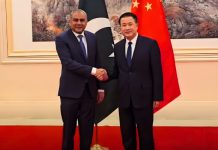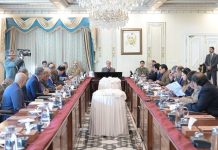-Government seeks Ulema to announce calling off Juma
congregations
-Ulema lay onus on government
-Prayers advised to be held in Masajid with restrictions
-Al-Azhar Fatwa to amend Azaan wording as ‘Pray at homes’ endorsed
By Shakeel Ahmed
ISLAMABAD: Religious scholars assured that they would “comply with the instructions” issued by the government in order to curb the coronavirus pandemic during a meeting with President Arif Alvi on Thursday.
According to a statement released by the President’s office after the meeting, the Ulema also promised to extend their “complete support” to the government in its efforts to contain the spread of the novel coronavirus.
President Alvi had held a meeting with the scholars today to discuss if religious congregations, including Friday prayers, should be suspended during the coronavirus outbreak. The statement, however, made no mention of the matter.
“The president highlighted
the preventive measures which needed to be taken by the people to stop spreading the disease,” the statement read. “He emphasised that the only solution to the present crisis was to maintain social distancing and act upon the guidelines provided by Islam to cope with such situation.
“The ulema assured their complete support and said that they would comply with the instructions given by the government.” President Alvi chaired the meeting at President House. and scholars from all four provinces, Gilgit Baltistan (GB) and Azad Jammu and Kashmir (AJK) attended the meeting through video link from governor houses across the country. Those from Islamabad and Rawalpindi were physically present. The president was supposed to apprise the scholars about the fatwa issued by Egypt’s Al-Azhar University, permitting suspension of Friday prayers to control the spread of the novel coronavirus across Pakistan.
He was expected to announce important decisions regarding these matters. Federal Minister for Religious Affairs and Interfaith Harmony Noorul Haq Qadri and Chairman of The Council of Islamic Ideology Dr Qibla Ayaz were advising the president on the matter. Authorities have held multiple consultations with scholars over whether prayer congregations should continue, as social distancing is vital to curb the spread of the novel coronavirus, which has already infected more than 1,000 people in the country. A large number of people are expected to gather in mosques tomorrow to attend Friday’s congregational prayers. Yesterday, in a meeting with Sindh governor at the Governor House, scholars agreed that people should take precautionary measures and vulnerable people should preferably offer prayers at home, but said that mosques should be kept open for congregations.
Earlier, President Alvi, through Egypt’s ambassador in Pakistan, had sought guidance from Al-Azhar institution, an authority on Islamic injunctions, for a word on the suspension of congregational prayers at mosques amid the spike in coronavirus cases. The institution issued an edict on the matter yesterday, in which it stressed that public gatherings, including congregational prayers at mosques, could result in the spread of coronavirus and the governments of Muslim countries had full jurisdiction to cancel such events.
The fatwa also emphasised on amending the Azaan (call to prayer) with words ‘Salaat Fi Buyut-e-kum’, meaning ‘pray in your homes’ instead of the usual ‘Hayya Ala Al Salah’ (come to prayer). Also, families within their homes can arrange group prayers, it added.
Federal Minister for Religious Affairs Dr Noor-ul-Haq Qadri has said that the federal government has decided to ‘restrain’ Friday congregational prayers as new cases of the novel coronavirus continue to emerge across the country.Addressing a news conference here on Thursday, Dr Noor-ul-Haq Qadri said, “It has been decided with a consensus that Friday prayers will be ‘restrained’. Only mosques’ administration staff and a limited number of worshippers will be allowed to pray inside mosques.”Mosques will not be closed but prayers and zikr will continue inside them, he clarified adding that the decision had been taken in consultation with ulema belonging to various schools of thought.Minister Religious Affairs said, “Ulema have been told to tell people to pray inside their homes. It is not only the job of the government to control coronavirus but also of the people.”
He said that various programmes, classes and examinations across various religious seminaries across the country had been postponed in light of the outbreak.Dr Qadri said that the government was in constant touch with the Saudi foreign office. “Saudi authorities have asked us not to take any final steps [regarding Hajj agreement] before they give the green signal,” he said.
He said that Saudi Crown Prince Mohammed bin Salman will take the final decision on Hajj 2020 after holding consultations with the heads of various Islamic countries.”Islam teaches us that the one offering the prayer is more important than the prayer itself,” he said. “Governments across the world are making decisions according to the evolving situation. We are doing the same,” he added.
Following a meeting of the National Coordination Committee (NCC) on Covid-19, members of the federal government — including Asad Umar, Zafar Mirza, Firdous Ashiq Awan and Noorul Haq Qadri — along with National Disaster Management Authority (NDMA) chief shared updates on key decisions taken during today’s huddle. Federal Minister for Planning, Development and Special Initiatives Asad Umar said that today was the fifth meeting of the NCC.
Among the decisions taken in today’s meeting, Umar announced that the closures of educational institutions across the country would be extended till May 31. He said that Federal Minister for Education and Professional Training Shafqat Mahmood had said that this decision was taken in agreement with all provinces.
With regards to the transportation system, Umar said that during a meeting of the NCC that is set to take place tomorrow, difficulties faced by transporters will be discussed and reviewed. Umar shared a team would work on data analytics so that decisions can be taken on the basis of “data […] and the on-ground situation not on the basis of emotions”.
Additionally, he said that another team is working daily on ensuring the implementation of an economic package announced earlier. The federal minister assured that there is no shortage of atta, while responding to reports of a shortage in parts of the country. He said that in order to deal with immediate shortages, provinces with stocks were requested to speed up the pace of releases.
“You should be reassured, there is no shortage,” he said.
Umar added that Prime Minister Imran Khan will announce two more “big initiatives” in the coming days, adding that the details of these programmes will be finalised in the next few days.
Umar said that representatives of all provinces as well as federal government officials will now work at the National Command Centre in NDMA in order to ensure that all people working on the coronavirus are in one place and can share data, exchange questions.
The federal minister added that Prime Minister Imran had told him to mention that some people were hoarding and taking advantage of the current situation.
He said that this is not just a crime in the country but in God’s eyes as well. Umar urged citizens to report such incidents. No shortage of PPE supplies for healthcare workers by April 5. Special Assistant to Prime Minister on Health Dr Zafar Mirza provided updates with regards to the current Covid-19 cases in the country as well as decisions taken regarding personal protection equipment (PPE) for healthcare workers. Mirza said that after looking at supplies, by April 5, the country would have enough PPE supplies so that doctors, nurses, paramedics handling coronavirus patients won’t face a shortage. He said that large supplies are in process and by April 5, the situation will improve.
Additionally, Mirza announced that an expert on infectious diseases Dr Faisal Sultan has been included in the government’s team as the focal point for coronavirus with regards to the health aspect.
On the national level, a training programme for doctors, nurses and paramedics will also be launched.
The premier’s special assistant said that there are four main steps regarding social distancing: don’t go out unnecessarily, you should have a very important reason to go out, if you need to step out maintain a two metres distance, don’t shake hands or hug people, and wash your hands with soap or use sanitiser.
National Disaster Management Authority (NDMA) Chairman Lt Gen Muhammad Afzal provided updates on medical supplies in the country.
He said that currently the number of intensive care unit beds in Pakistan stands at 19,670. Afzal said that total number of quarantine beds across the country is 162,000. He said that three-star and four-star hotel have been booked for the purpose and five-star hotels will be used as the fourth line of defence.
The NDMA chief said that there are 194,000 medical health practitioners in Pakistan, of whom 30,000 work in ICUs. He also shared that these ICU medical practitioners will be provided with a kit, including a gown, masks etc.
With regards to ventilators, the NDMA chief said that there were 61 ventilators that were not functioning. He added, however, that the Pakistan Defence Forces had an institution that has offered to repair these. Afzal said that by April 10-15, imported ventilators will increase to 1,000. By April 25, this number will rise to 2,000 to 3,000. He said that by May, it may increase to between 8,000 and 10,000.
Federal Minister for Religious Affairs and Interfaith Harmony Noorul Haq Qadri provided an update regarding offering prayers at mosques.
He said that the NCC had decided that mosques will not be closed. Qadri said that mosques will have azaan (call to prayers) and tilawat. With regards to offering congregational prayers at mosques, Qadri said that this will be “limited”. He said that mosque imams, staff, regular attendees in limited numbers those who are healthy and not older than 50 years of age will be able to offer prayers in the mosque in limited numbers.




